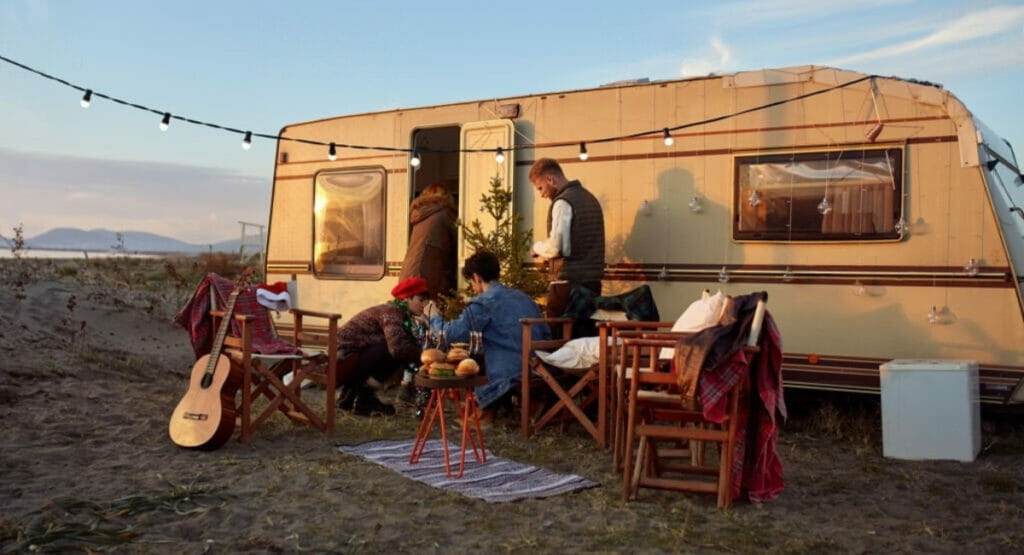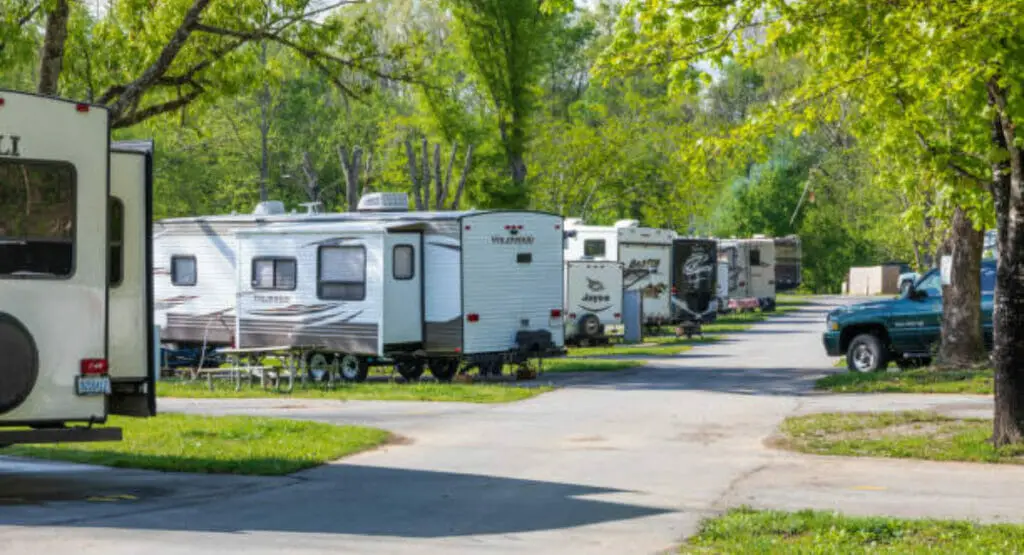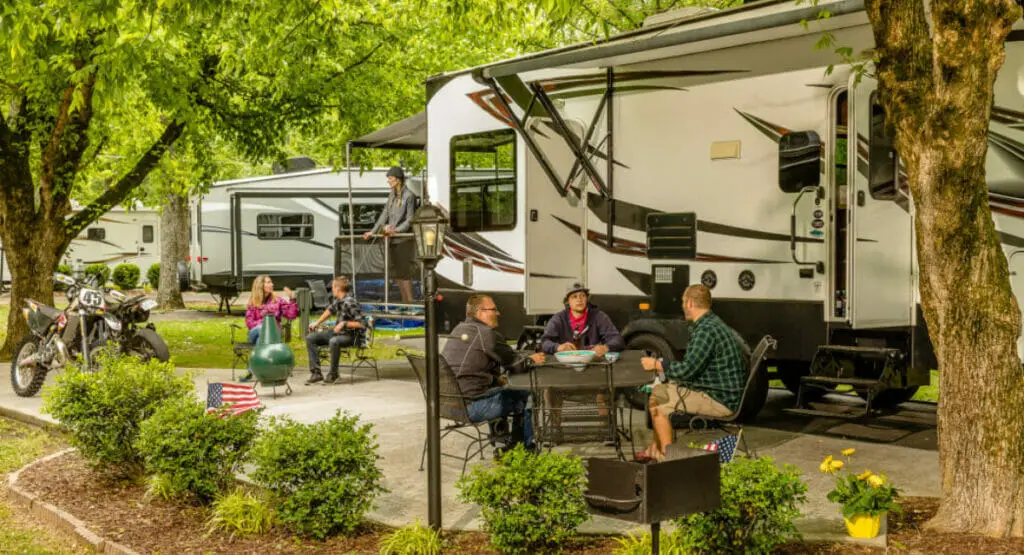Are you sick of the daily grind and want to hit the open road? Full-time RV life might be just what you need. Living full-time in an RV enables you to see new areas, meet new people, and enjoy a simpler life. Moreover, as remote work becomes more widespread, many individuals are learning that they can work from any location, even their RV.
Are you ready to say goodbye to rush-hour traffic, workplace politics, and the same old routine every day? Full-time RV living may be the answer if you’ve always wanted to live on the road. Imagine waking up every day to a fresh vista, meeting intriguing people from around the globe, and discovering the nooks and crannies of the place you’ve always wanted to visit. And with remote work becoming more common, you can take your career with you on the road and make the most of your time away from the grind.
But before you hit the road, there are a few things you should be aware of. Full-time RV living requires meticulous planning and preparation. You’ll need to consider everything from the kind of RV to purchase to how you’ll handle your money while on the road. So don’t worry; we’ve got your back. In this piece, we’ll go over the essential RV equipment, maintenance suggestions, parking alternatives, and budgetary concerns. Now fasten your seatbelts, and let’s go!
1. Must-Have Equipment for Full-Time RV Living
a. RV Kitchen Essentials
First and foremost, let’s go through the necessities for cooking up a storm in your RV kitchen
1. Portable Grill or Stove
No matter where you travel, you’ll need something to cook on and with a storm in your RV kitchen. No matter where you travel, you’ll need something to cook on and with. That is why having a portable grill or stove is essential for full-time RV life. You can only sometimes depend on the campfire, and having your own cooking equipment allows you to prepare a meal whenever and wherever you choose.
2. Cast Iron Skillet
You’ll also need cookware after you’ve purchased your grill or stove. A cast-iron skillet is an excellent alternative since it’s robust and multifunctional. It can cook anything from eggs to steak and easily transition from burner to oven.
3. Collapsible Kitchenware
Nevertheless, let’s face it: the room is limited in an RV. This is when foldable cookware comes into play. You may get anything from foldable bowls and colanders to measuring cups and spoons. When not in use, they fold up neatly and take up little room.
4. Instant Pot or slow cooker
Let’s move on to the Instant Pot or slow cooker. These RV cooking appliances are game changers. They’re small and portable, and they can cook anything from soups to roasts to desserts. They also save you time and energy, giving you more time to explore.
5. Utensils, plates, cups, and bowls
To go along with all that culinary equipment, you’ll need utensils, plates, cups, and bowls. Choose lightweight, sturdy solutions that will not take up too much room. You don’t want to be carrying heavy tableware around or continually cleaning dishes.
You’ll be able to cook up a storm and enjoy excellent meals no matter where the road takes you with these must-have kitchen basics.
b. Cleaning Supplies
Keeping your RV clean and tidy is important for a happy and healthy life on the road. That’s why having some cleaning essentials on hand is a must.
1. All-purpose cleaner
This magical solution can tackle everything from countertops to sinks to floors. Opt for a multi-purpose cleaner that can do it all and make cleaning a breeze.
2. Broom and dustpan
A broom and dustpan are essential for keeping your floors free of dirt, sand, and whatever else the road throws your way. Plus, they’re lightweight and easy to store.
3. Trash bags
You’ll also need trash bags to dispose of all that dirt and debris. Make sure your bags are durable and leak-proof and consider getting a small trash can keep your space tidy.
4. Paper towels
When it comes to cleaning up spills or wiping down surfaces, paper towels are a lifesaver. They’re lightweight, absorbent, and can be used for everything from cleaning up a spill to wiping down your kitchen counter.
5. Laundry detergent
And last but not least, don’t forget about the laundry. You’re going to need laundry detergent to keep your clothes clean and fresh. Look for a compact and space-saving option, and consider getting some stain remover for those pesky spills.
With these cleaning essentials, you’ll be able to keep your RV tidy and clean no matter where the road takes you. So go ahead, get a little messy, and know that you have everything you need to clean up in a jiffy.
c. Outdoor Equipment
Living in an RV is about more than just the interior of your vehicle; it’s also about enjoying the great outdoors. As a result, keeping certain outdoor basics on hand is necessary for full-time RV life.
1. Folding chairs and table
Having comfy and compact outdoor furniture is essential, whether you’re enjoying a dinner beneath the stars or just lazing outdoors.
2. Outdoor mat
An outdoor mat is ideal for keeping dirt and sand at bay while also providing a comfortable place to rest outdoors.
3. Grilling utensils
Get a durable set that includes tongs, a spatula, and a grill brush. You’ll be able to cook excellent dishes on the grill while still keeping it clean.
4. Portable fire pit
As the sun sets, a portable fire pit is ideal for remaining warm and comfy. It not only provides heat, but it also creates a pleasant and appealing environment for socializing with friends and family.
5. Camping hammock
Last but not least, don’t neglect leisure. A camping hammock is ideal for relaxing and taking in the scenery. A hammock is an ideal place to unwind and relax, whether you’re napping or reading a book.
You’ll be able to fully appreciate the beauty of the great outdoors while living in your RV if you have these outdoor requirements. Set up your outdoor living area and prepare to create some great moments.
2. Maintaining Your RV
a. Regular Maintenance
As a full-time RVer, you’re not just responsible for maintaining your home on wheels, but also for keeping it running smoothly. That’s why regular maintenance is crucial for ensuring your RV is in tip-top shape. Here are some maintenance tasks you should keep in mind:
1. Oil changes
Just like a car, your RV’s engine needs regular oil changes to keep it running smoothly. Be sure to follow the manufacturer’s recommended schedule and use the appropriate oil for your RV.
2. Tire rotations:
Your RV’s tires carry a lot of weight and endure a lot of wear and tear on the road. Regular tire rotations help distribute wear evenly, extending the life of your tires and ensuring safer driving.
3. Checking fluid levels:
Your RV has several fluids that need to be checked and topped up regularly, including coolant, brake fluid, and transmission fluid. Check your owner’s manual for instructions on how to check and add fluids.
4. Annual inspections:
Finally, it’s important to have an annual inspection of your RV to catch any potential issues before they become big problems. This includes checking the brakes, suspension, electrical system, and more.
By keeping up with these maintenance tasks, you’ll not only prolong the life of your RV but also ensure your safety on the road. So go ahead, give your RV some TLC, and hit the road with confidence!
b. Tips for Keeping Your RV Clean
Maintaining the cleanliness of your RV is essential not just for its beauty, but also for your health and general well-being. In this post, we’ll provide you with some useful tips and tactics for keeping your RV clean and neat no matter where your travels take you.
1. Sweep and mop on a regular basis:
Sweeping and mopping on a regular basis is one of the most critical things you can do to keep your RV clean. Dirt and trash may rapidly accumulate in confined places, so it’s critical to keep on top of it. To make the process simpler, invest in a small broom and dustpan, as well as a lightweight mop.
2. Employ carpets to keep dirt and sand out:
Using rugs is another fantastic method to keep your RV clean. Before entering your RV, place a mat outside the entrance to wipe away any dirt or debris. Indoor rugs capture dirt and sand, preventing it from being embedded in the carpet or flooring.
3. Keep clutter to a minimum:
Clutter can quickly accumulate in small spaces like an RV, making it feel cramped and messy. Invest in storage bins and organizers to keep things nice and tidy to keep clutter to a minimum. Go through your stuff on a regular basis and give or sell whatever you no longer need.
4. Clean the bathroom and kitchen on a regular basis:
The bathroom and kitchen in an RV are heavy-traffic areas that may rapidly get unclean and unhygienic if not cleaned on a regular basis. At least once a week, thoroughly clean the bathroom and kitchen, wiping down countertops, sinks, and toilets with disinfectant.
5. To keep your RV smelling fresh, use air fresheners:
Odors may easily accumulate in a compact place such as an RV. To keep your RV smelling fresh and clean, use air fresheners or essential oil diffusers. To eradicate scents, you may also use natural odor absorbers such as baking soda or charcoal.
You can maintain your RV clean and neat no matter where your travels take you if you follow these basic suggestions.
c. RV Safety Tips
Having adequate safety precautions in place is an important component of RV life. By following these safety precautions, you will be better prepared to deal with any situation that may arise while living in an RV. Here are some pointers to keep you prepared:
1. Regularly inspect the smoke and carbon monoxide detectors:
In the event of a fire or a gas leak, smoke, and carbon monoxide detectors are your first line of defense. To ensure that they are in excellent working condition, test them on a regular basis and replace the batteries as required.
2. Have a fire extinguisher nearby:
In the event of a fire, having a fire extinguisher nearby may help prevent it from spreading. Be sure you have one and understand how to use it.
3. Have emergency supplies, including a first-aid kit, on board:
You never know when an emergency may occur; therefore, it is important to be prepared. Have a fully stocked first-aid kit on board, as well as other supplies like flashlights, batteries, and a portable radio.
4. In an emergency, know how to switch off your propane and water supplies:
It’s critical to know how to turn off your propane and water supply in the event of a gas leak or a water emergency. Take some time to get acquainted with the procedure so that you can respond quickly if necessary.
3. Finding Places to Park
a. RV Campsites
1. RV parks and campgrounds
RV parks and campsites provide a range of services, including electricity hookups, water and sewage connections, and laundry facilities and showers. These are often located on major roads and are ideal for tourists searching for a fast overnight stay or a longer stay. RV parks and campgrounds come in a variety of sizes and designs, ranging from simple campsites to luxurious resorts with swimming pools, hot tubs, and restaurants.
2. State and national parks
State and national parks are often among the most scenic and natural areas to camp. They usually provide a more primitive camping experience with less facilities, but you get to immerse yourself in the great outdoors. Hiking paths, fishing, and other outdoor activities are offered in many state and national parks. It’s worth noting that these parks might become busy during the high season, so plan ahead and reserve your tent as soon as possible.
3. Private campgrounds
Individuals or businesses own and manage private campsites, which can provide more facilities than state and national parks. Swimming pools, gaming rooms, playgrounds, and other leisure amenities may be available. For people who do not own an RV, several private campsites provide cabin rentals.
4. Membership campgrounds
Membership campsites are often private campgrounds that charge a membership or an annual fee to use their amenities. They often provide a wide range of facilities and activities, such as swimming pools, tennis courts, and organized social events. These parks might be an excellent choice for full-time RVers who desire year-round access to facilities and activities.
Whichever sort of campground or park you select, do your homework and reserve your space ahead of time. Several popular parks and campsites rapidly fill up, particularly during peak season. Furthermore, verify the campsite laws and regulations before you come to ensure you’re ready for your stay.
b. Boondocking
1. Camping off-grid without hookups
Camping without connections may be a terrific way to disconnect from electronics and appreciate nature without the distractions of modern technology. Yet, just because you’re in the middle of nowhere doesn’t mean you have to forego all creature comforts. Even without connections, you may have a nice camping trip with the correct equipment.
2. Use solar panels and generators for power
A solar panel is a must-have for off-grid camping. Without the need for a connection, solar panels may offer a steady supply of electricity for your RV. These may be mounted on the top of your RV and charge your batteries while you’re out touring throughout the day. This means you can keep using your lights, charging your electronics, and even running tiny appliances.
A generator is another excellent choice for off-grid camping. When the sun isn’t shining or you need more electricity than your solar panels can offer, a generator can help. Generators may be powered by gas, propane, or even diesel and can power bigger items such as air conditioners or freezers.
Conclusion
Finally, for a successful and happy full-time RV living experience, keep your RV clean, well-maintained, and equipped with the required supplies. Frequent cleaning and organizing may help create a pleasant and appealing living environment, while periodic maintenance can assist avoid unforeseen problems down the line. Moreover, being prepared for emergencies and understanding how to live off-grid may make or break your journey. You can set yourself up for a successful and satisfying full-time RV living if you follow these recommendations. So, gather your necessities, hit the road, and enjoy the ride!



